Magarsha
This article is incomplete because it is pending further input from participants, or it is a work-in-progress by one author. Please comment on this article's talk page to share your input, comments and questions. Note: To contribute to this article, you may need to seek help from the author(s) of this page. |
Dominion of Magarsha Mion a Magasha (Magarshan) | |
|---|---|
|
Flag | |
 | |
| Capital and largest city | Magarsha City |
| Official languages |
|
| Religion | Voltanism |
| Demonym(s) | Magarshan |
| Government | Unitary Totalitarian Theocratic Dictatorship |
• Supreme and Holy Leader | Tala Volta |
• Grand General | Myra Dolo |
• Dinok of Labour and Minery | Jary Minan |
| Legislature | none |
| Area | |
• Total | 36,400,298 km2 (14,054,234 sq mi) (1st) |
| Population | |
• 3000 census | 3,585,879,593 (1st) |
• Density | 98.5/km2 (255.1/sq mi) (53rd) |
| GDP (PPP) | 3000 estimate |
• Total | $261.2 trillion (2nd) |
• Per capita | $72,849 (11th) |
| GDP (nominal) | 3000 estimate |
• Total | $177.4 trillion (2nd) |
• Per capita | $49,482 (23rd) |
| Gini (3000) | 97.4 very high (82nd) |
| HDI (3000) | 0.57 medium (75th) |
| Currency | Magarshan Volt (MAV) |
| Time zone | UTC+1.5 (Magarshan Standard Time) |
Magarsha, also known as The Dominion, officially the Dominion of Magarsha is a nation encompassing the entire continent of Africa and significant portions of southern Europe, the Middle East, and northern and northeastern-0 Antarctica. It is bordered by Sranca, Doitlan, and Transinta to the north, Persha to the northeast, and the Federation of Sol in Antarctica.
Magarsha has been governed by a theocratic dictator of the Volta family since 2423; 577 years. Throughout these years, treatment of the people has fluctuated, but HRC-FS human rights have been consistently violated. Magarsha is a founding member of and operates the ESEP, essentially controlling Tania, Sranca, Doitlan, and Transinta as a proxy. It ranks the lowest for civil liberties, HRC-FS human rights, and political freedom, especially for the Magarsha Repopulation Program.
Magarsha’s economy focuses heavily on mining and has little economic activity outside the country. Magarsha’s mining operations include practically every metal ore and stone available on Earth. All mining cities in Africa and the Middle East are completely underground or inside Bouali Domes due to the extreme heat. Every city in Magarsha includes at least one mine, except for the capital, Magarsha City. Magarsha is a world superpower due to its exceedingly large and advanced military, its practical monopoly on several Terran natural resources, and its powerful sphere of influence and is considered humanity’s most dangerous threat ever, other than the Collapse of the World.
Magarshan society is entirely controlled by the government and Voltanism. The seven core principles of Magarsha are Service, Children, Equity, Mining, Reverence, Conquest, and Acceptance, and these are the foundation for Magarshan society. Anyone who violates these principles is considered a “danger to humanity” and “must be extinguished” according to the constitution of Magarsha. All citizens are expected to allocate a portion of their paycheck to the less fortunate and all are expected to provide service to their local community. Despite these not being written laws, they are tied into the Service principle, and have major repercussions if not followed. Approximately 90% of citizens receive an identical salary, own identical property, and work in the mining industry. To maintain equity across all of Magarsha, mandatory education is provided from age 0 to 13, after which they are given a selection of jobs to choose from. Any education past age 13 is only available to aristocracy, which make up 0.001% of the population. Children has been a core principle of Magarsha since the Collapse of the World when population was dangerously low.
Etymology
Magarsha adopted the name of the City of Magarsha after the city cut contact with the Federation of Sol. The city itself was named by a 48 year old woman named Fatoumata Tadesse during a naming competition. The name was chosen for it's African vernacular and easy English pronunciation and eventually won the contest by a decent margin against the runner up, Busaku.
